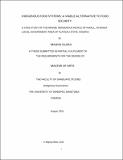Indigenous Food Systems: A Viable Alternative to Food Security; A Case Study of the Irigwe Indigenous People of Kwall, in Bassa Local Government Area of Nigeria

View Open
Metadata
Show full item recordAuthor
Oloko, Majing
Date
2016-08Citation
Oloko, Majing. Indigenous Food Systems: A Viable Alternative to Food Security; A Case Study of the Irigwe Indigenous People of Kwall, in Bassa Local Government Area of Nigeria. A Thesis submitted in partial fulfilment of the requirements for the degree of Master of Arts in the Faculty of Graduate Studies (Indigenous Governance), the University of Winnipeg. Winnipeg, Manitoba, Canada: University of Winnipeg, 2016. Master of Arts in Indigenous Governance
Abstract
Despite the central role that Indigenous foods can potentially play in meeting people’s food security needs in Nigeria, it has continually been ignored by Government and policy makers. With 65% of Nigerian’s considered food insecure, and a rapidly growing population, there are calls for a more sustainable food security policy. In order to highlight local prospects and encourage the recognition of Indigenous food and knowledge, this qualitative case study focused on the Irigwe Indigenous food system, from Kwall community, in Bassa Local Government Area (LGA), Plateau State, Nigeria. Interviews and talking circle were conducted for 30 participants to collect data on the Irigwe Indigenous food system: their food and its nutritional and medicinal value, the challenges that the people encounter in their bid to access their food and their insights on how their community’s food security can be improved. Participants were able to identify 23 Indigenous foods (grains, tree plants, vegetables and fish) they utilize for nutritional and medicinal purposes. Ibre (Eleusine coracana) and riti (Vernonia amygdalina) are examples of some foods with nutritional, medicinal and cultural significance. 18 participants said they use their food for both nutritional and medicinal value. Subsistence farming is the dominant means by which participants access their food. 10 participants access their food exclusively through farming. Other means of accessing food include wild food harvesting, sharing, exchange and purchase. Among all the challenges participants face in accessing their food, human insecurity is the dominant challenge facing participants. Other challenges include environmental challenges, threats to Indigenous species and developmental challenges. Participants suggested that dry season farming should be made more accessible, and traditional farming techniques should be more innovative in order to attain sustainable food security in households and the community at large. They would also want to participate in policy discussions and programme implementation.
